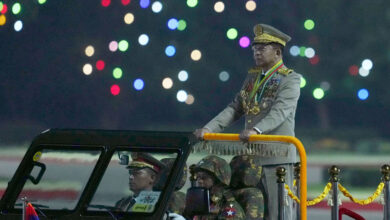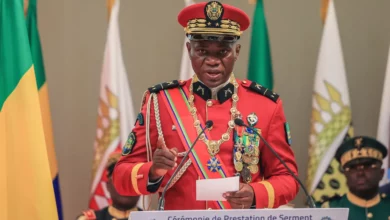The mere result of the constant clashes between protesters and the remnants of Mubarak’s regime in the Ministry of Interior is radicalizing the Egyptian public. The irresponsible reaction of Field Marshal Hussein Tantawi, the head of the Supreme Council of the Armed Forces, who urged Egyptians to fight those who caused the massacre in Port Said, reflects this reality. Aside from the massacre, pushing Egypt toward fragility and disorder appears to be a deliberate and planned tendency.
Since they took power after the disposal of Hosni Mubarak, the junta sought to diffuse the revolutionary mood among ordinary Egyptians and turn them against revolutionary forces. To achieve this goal, they adopted a shrewd policy based on dismantling the revolutionary bloc. It started first by fueling the political disputes and schism among political forces through the proposal of “supra-constitutional principles,” which put Islamists in the face of liberal and secular forces. Second, it waged a relentless and ugly media campaign against activists to discredit them, such as the April 6 Youth Movement and the Revolutionary Socialists, etc. Third, it raided and attacked human rights organizations and NGOs that supported the revolution and sought to sue the military for its awful mistakes during the transition. And now it seeks to smear the ultras, the football fans, and punish them for their courageous role during the revolution. However, what the junta does not realize is that the ultras and young activists are aware of such useless policy. Hence, they insist to continue the revolution despite its high cost.
Nevertheless, the utter failure of the junta in achieving any of the previous goals pushed it to use the last card left, namely to radicalize the mob to justify their abortion of the revolution. The apathetic response of Tantawi to the Port Said massacre signals to this. Instead of sacking the government or dismissing the interior minister, Tantawi appeared unconcerned and played down the consequences of the massacre. Ironically, he blamed people for not fighting each other.
By not acting responsibly, SCAF is pushing the mob into a corner. It drives them crazy by maintaining the state of frustration and disenchantment among protesters.
The consequences, however, of such policy will backfire against the junta and undermine its power for many reasons. First, the main bulk of the current wave of protesting, particularly the ultras fans, belongs to the lower-middle and lower income groups. They have already paid a huge price before and after the revolution. Hence, they are now fighting not only to build a real democracy but, more importantly, to avert any attempt to revive Mubarak’s regime and reproduce its structures. Second, if the mob decided to turn against the military, no one will be able to stop them. The experience of the daily clashes between the mob and security forces enhanced their ability to withstand for days, if not weeks, in the face of security repression. They adopted an “exhaustion warfare” strategy in dealing with security forces and have devolved the skills to manipulate them. It was the strategy that led to the startling collapse of the security forces in the inception of the revolution on 28 January last year. Additionally, if the junta disavowed the current crisis and did not take real and quick decisions to absorb the mob’s rage, they will become the next target.
Hence, the epicenter of protesting will move from the Ministry of Interior to the Ministry of Defense, which no one wants to happen. Over the past few months, protesters have already attempted to demonstrate in front of the Ministry of Defense; however, with the continuing impasse, it is likely to happen again and much more forcefully.
Radicalizing the mob already started during the Mohamed Mahmoud clashes last November, when hundreds of peaceful protesters were shot dead, lost their eyes or brutally wounded. SCAF’s provocation reached a tipping point after attacking the sit-in at the cabinet building last December, when military forces blatantly beat and dragged protesters.
This radicalization could lead at some point to a militarization of the revolution, which will put the country on verge of a complete chaos. Those who are protesting against the rotten Ministry of Interior insist on bringing it down, not only because of its brutal and bloody record but mainly because of its role in subverting the revolution and working in favor of Mubarak’s regime. It is exemplifying the core of the old system, which needs to be fundamentally purged.
More importantly, the mob has lost confidence in the newly elected Parliament to take revolutionary action against SCAF. Parliament, however — the only legitimate institution in Egypt — seems powerless and useless. Up until now, it has neither dared to confront SCAF, holding it accountable for the Port Said massacre, nor was it able to put an end to the mounting clashes in downtown Cairo between protesters and security forces. Parliament’s response was shameful and disappointing to many Egyptians who felt betrayed by their MPs.
Clearly, the mob lost faith and trust in the state’s institutions, e.g. judiciary, the government and Parliament. They no longer believe that such institutions have the will or power to uphold justice; this skepticism could push the country to the edge of complete failure and disorder.
Khalil al-Anani is a scholar of Middle East politics at Durham University’s Middle East Institute.




